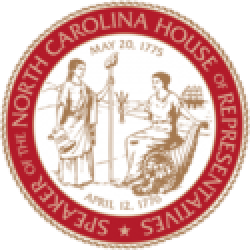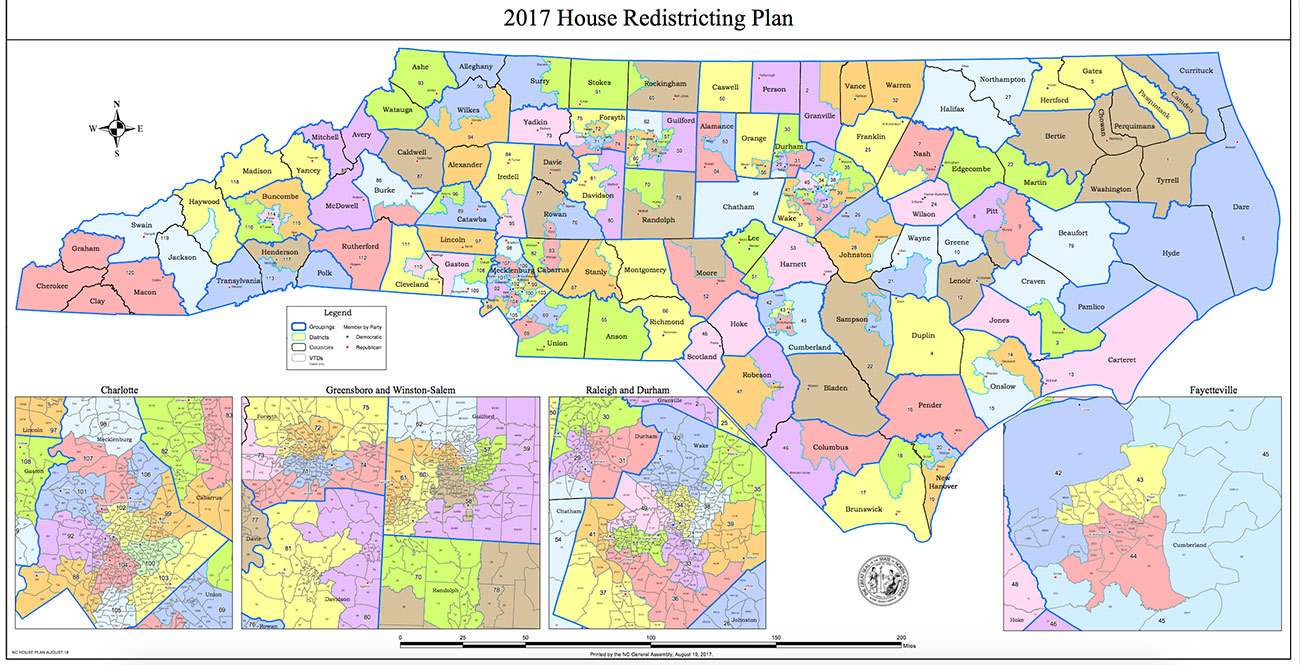Randomly selected map modeled by Democratic Party’s expert to consider incumbency as allowed by court ruling
“The partisan distribution of seats in plans under House Simulation Set 2 is nearly identical to the partisan distribution of House Simulation Set 1, which ignored incumbency protection,” Democrats’ expert wrote (p. 47)
Democratic Party expert’s report (p.47 – 49): “We are able to conclude with extremely high statistical certainty” that partisan outcomes under maps factoring incumbency are “nearly identical” to those that do not
Raleigh, N.C. – The state House Redistricting Committee this week moved to comply with a court order to redraw the General Assembly’s election boundaries by working from random computer-generated nonpartisan maps modeled by the Democratic Party’s expert witness in the trial challenging those districts.
Despite the U.S. Supreme Court ruling this summer that legislative redistricting was a nonjusticiable political issue, a three-judge state court panel nonetheless imposed an unprecedented order on the North Carolina General Assembly to reform its election maps in a two-week timeframe.
With the General Assembly in recess and a hurricane striking the North Carolina coast in the first week under the order, the legislature now has a little more than one week remaining to strictly comply with the court’s ruling.
For the first time in North Carolina history, the state General Assembly was directed by the state court panel to redraw legislative maps with no consideration of political factors.
Committee leaders said working from nonpartisan maps produced by the Democratic plaintiffs’ expert witness in the redistricting trial was the fairest, most expeditious, and most compliant method to follow the court’s order in the condensed timeframe provided therein.
The process will take place in committee rooms at the state legislature that will have constant live streams for the public to view.
State House Redistricting Committee Chairman David Lewis (R-Harnett) said that while the legislature’s leadership disagrees with the findings of fact and conclusions of law by the three-judge panel, they intend to comply with the order and proceed with all due haste relying on a randomly selected base map produced by the Democratic Party’s own expert witness.
“This is a publicly transparent process that will yield an outcome compliant with the court’s order within the significant time constraints it imposed,” Chairman Lewis said.
“Dr. Chen’s maps comply with every aspect of the court’s objective criteria – including exclusion of any political considerations – were produced as public records by the Democratic Party plaintiffs at trial, and form a strong foundation for base plans with which to begin this committee’s redistricting work.”
Dr. Jowei Chen, an Associate Professor of Political Science at the University of Michigan, was accepted by the three-judge panel in Common Cause v. Lewis as an expert witness for the plaintiffs in matters of legislative redistricting.
His randomly generated computer maps were compared to North Carolina’s actual legislative maps in the redistricting trial, making Dr. Chen’s models a strong and compliant foundation for the legislature to begin its process.
Dr. Chen’s models inherently comply with the court order since they took no partisan advantage into account, committee leaders said. The committee planned to take reasonable efforts to improve upon the map through compactness, avoiding splitting voting districts, precincts, and municipal boundaries.
The committee directed its nonpartisan central staff to use those court-ordered objective criteria to select the most compliant statewide maps from Dr. Chen’s thousands of computer generated models and then randomly select one of those plans.
Lawmakers opted to select a base map modeled by Dr. Chen that purposefully avoids ‘double-bunking’ multiple current incumbent members of the state House of Representatives in the same district.
Dr. Chen’s expert report found that “not pairing multiple incumbents can be achieved without significantly subordinating any of the non-partisan traditional criteria” and that the partisan distribution of maps that factored incumbency are “nearly identical to the partisan distribution of House Simulation Set 1, which ignored incumbency protection.”
Dr. Chen’s report said “we are able to conclude with extremely high statistical certainty” that incumbent protection “does not cause or explain” partisan distributions under the enacted legislative maps.
Chairman Lewis said nonpartisan central staff will be available around the clock through the court’s deadline, and the committee moved that the process will take place entirely in the committee room in public view through a video live-stream.
The committee also moved to stand ‘at-ease’ between meetings, maintain the public live-stream at all times, and conduct all legislative activity for purposes of the remedial process in the committee room.
Members of the committee were advised not to discuss the maps outside of the meetings, and that the court prohibited the production of political data by nonpartisan staff related to legislative election boundaries.
The state House Redistricting Committee will continue its meetings to comply with the three-judge panel ruling on Tuesday.


